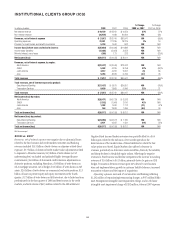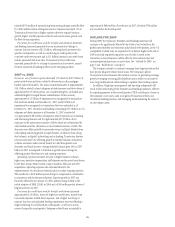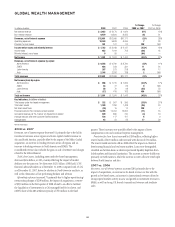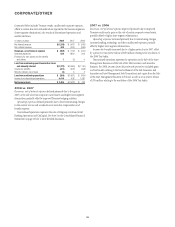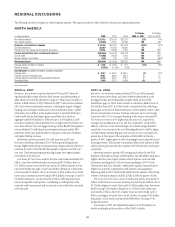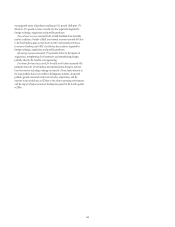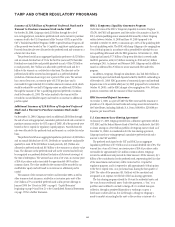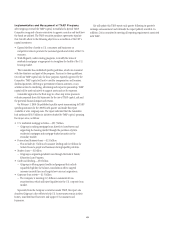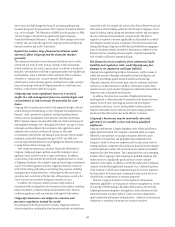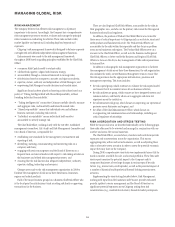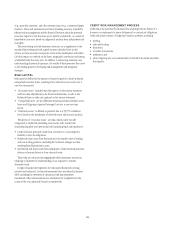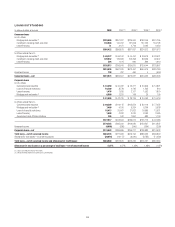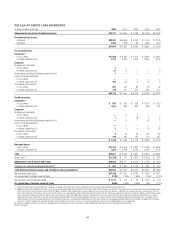Citibank 2008 Annual Report Download - page 50
Download and view the complete annual report
Please find page 50 of the 2008 Citibank annual report below. You can navigate through the pages in the report by either clicking on the pages listed below, or by using the keyword search tool below to find specific information within the annual report.TARP AND OTHER REGULATORY PROGRAMS
Issuance of $25 Billion of Perpetual Preferred Stock and a
Warrant to Purchase Common Stock under TARP
On October 28, 2008, Citigroup raised $25 billion through the sale of
non-voting perpetual, cumulative preferred stock and a warrant to purchase
common stock to the U.S. Department of the Treasury (UST) as part of the
UST’s Troubled Asset Relief Program (TARP) Capital Purchase Program. All
of the proceeds were treated as Tier 1 Capital for regulatory capital purposes.
Proceeds from the sale were allocated to the preferred stock and warrant on a
relative fair value basis.
The preferred stock has an aggregate liquidation preference of $25 billion
and an annual dividend rate of 5% for the first five years and 9% thereafter.
Dividends are cumulative and payable quarterly in cash. Of the $25 billion
in cash proceeds, $23.7 billion was allocated to preferred stock and $1.3
billion to the warrant on a relative fair value basis. The discount on the
preferred stock will be accreted and recognized as a preferred dividend
(reduction of Retained earnings) over a period of five years. The warrant
has a term of ten years, an exercise price of $17.85 per share and is
exercisable for approximately 210.1 million shares of common stock, which
would be reduced by one-half if Citigroup raises an additional $25 billion
through the issuance of Tier 1-qualifying perpetual preferred or common
stock by December 31, 2009. The value ascribed to the warrant will be
recorded in our stockholders equity and result in an increase in additional
paid in capital.
Additional Issuance of $20 Billion of Perpetual Preferred
Stock and a Warrant to Purchase Common Stock under
TARP
On December 31, 2008, Citigroup raised an additional $20 billion through
the sale of non-voting perpetual, cumulative preferred stock and a warrant to
purchase common stock to the UST as part of TARP. All of the proceeds were
treated as Tier 1 Capital for regulatory capital purposes. Proceeds from the
sale were allocated to the preferred stock and warrant on a relative fair value
basis.
The preferred stock has an aggregate liquidation preference of $20 billion
and an annual dividend rate of 8.0%. Dividends are cumulative and payable
quarterly in cash. Of the $20 billion in cash proceeds, $19.5 billion was
allocated to preferred stock and $0.5 billion to the warrant on a relative value
basis. The discount on the preferred stock will not be accreted and will only
be recognized as a preferred dividend (reduction of Retained earnings)at
the time of redemption. The warrant has a term of 10 years, an exercise price
of $10.61 per share and is exercisable for approximately 188.5 million
common shares. The value ascribed to the warrant will be recorded in our
stockholders’ equity and will result in an increase in additional paid in
capital.
The issuance of the warrants in October and December 2008, as well as
other common stock issuances, resulted in a conversion price reset of the
$12.5 billion of 7% convertible preferred stock sold in private offerings in
January 2008. See “Events in 2008” on page 9, “Capital Resources”
beginning on page 94 and Note 21 to the Consolidated Financial Statements
on page 172 for a further discussion.
FDIC’s Temporary Liquidity Guarantee Program
Under the terms of the FDIC’s Temporary Liquidity Guarantee Program
(TLGP), the FDIC will guarantee, until the earlier of its maturity or June 30,
2012, certain qualifying senior unsecured debt issued by certain Citigroup
entities between October 14, 2008 and June 30, 2009 (proposed to be
extended to October 30, 2009), in amounts up to 125% of the qualifying debt
for each qualifying entity. The FDIC will charge Citigroup a fee ranging from
50 to 100 basis points in accordance with a prescribed fee schedule for any
new qualifying debt issued with the FDIC guarantee. At December 31, 2008,
Citigroup had issued $5.75 billion of long-term debt that is covered under
the FDIC guarantee, with $1.25 billion maturing in 2010 and $4.5 billion
maturing in 2011. In January and February 2009, Citigroup and its affiliates
issued an additional $14.9 billion in senior unsecured debt under this
program.
In addition, Citigroup, through its subsidiaries, also had $26.0 billion in
commercial paper and interbank deposits backed by the FDIC outstanding as
of December 31, 2008. FDIC guarantees of commercial paper and interbank
deposits cease to be available after June 30, 2009 (proposed to be extended to
October 30, 2009), and the FDIC charges a fee ranging from 50 to 100 basis
points in connection with the issuance of those instruments.
FDIC Increased Deposit Insurance
On October 4, 2008, as a part of TARP, the FDIC increased the insurance it
provides on U.S. deposits in most banks and savings associations located in
the United States, including Citibank, N.A., from $100,000 to $250,000 per
depositor, per insured bank.
U.S. Government Loss-Sharing Agreement
On January 15, 2009, Citigroup entered into a definitive agreement with the
UST, FDIC and the Federal Reserve Bank of New York (collectively, the USG)
on losses arising on a $301 billion portfolio of Citigroup assets (valued as of
November 21, 2008). As consideration for the loss-sharing agreement,
Citigroup issued non-voting perpetual, cumulative preferred stock and a
warrant to the UST and FDIC.
The preferred stock issued to the UST and FDIC has an aggregate
liquidation preference of $7.3 billion and an annual dividend rate of 8%. The
warrant has a term of 10 years, an exercise price of $10.61 per share and is
exercisable for approximately 66.5 million common shares. Citigroup
received no additional cash proceeds for their issuance. Of the issuance, $3.5
billion of the consideration for the preferred stock, representing the fair value
of the issued shares and warrant, will be treated as Tier 1 Capital for
regulatory purposes, and it is expected to add approximately 30 basis points
to the Tier 1 Capital ratio, on a pro forma basis, during the first quarter of
2009. The value of the premium ($3.5 billion) will be amortized and
recognized as an expense over the life of the loss-sharing agreement.
The loss-sharing program extends for 10 years for residential assets and
five years for non-residential assets. Under the agreement, a “loss” on a
portfolio asset is defined to include a charge-off or a realized loss upon
collection, through a permitted disposition or exchange, or upon a
foreclosure or short-sale loss, but not through a change in Citigroup’s
mark-to-market accounting for the asset or the creation or increase of a
44


